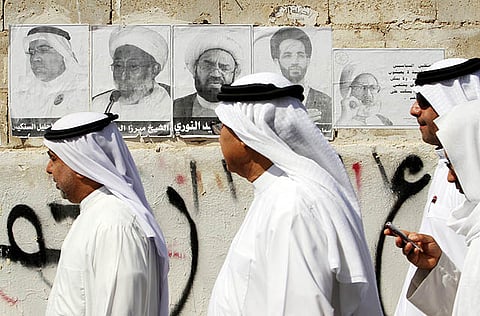Bahrainis vote in second round of parliamentary, municipal elections
Bahrainis vote in second round of parliamentary, municipal polls

Manama: Bahrainis cast their ballots to finalise the formation of the country's lower chamber and five municipal councils on Saturday. Polling stations opened at 8am and voters will have until 8pm to make their choices.
Voting slowed down in the early afternoon after scores of voters flocked in the early morning hours to polling stations to cast their ballots.
The second round of the parliamentary and municipal elections comes a week after Bahrainis voted to choose 31 lawmakers and 24 municipal councillors. The remaining nine lawmakers and 16 councillors are expected to be known later on Saturday evening or Sunday morning.
In focus: Bahrain elections 2010
Polling centres in Muharraq and the Central Governorate where three political societies have much at stake were singularly animated, mainly in their vicinity after vociferous and vivacious supporters sought to influence voters on their way to cast their ballots.
Under Bahrain's elections law, no type of propaganda is allowed within 100 metres of the polling stations. However, several supporters flouted the rules and kept distributing colourful pamphlets and handing out bottles of water with their candidate's smiling picture.
Some groups used loudspeakers to shout messages and urge people to vote for their candidates.
"We are aware of some of the violations, and we have been dealing with them," Judge Khalid Al Ajjaji, from the high elections committee, said. "The operations are proceeding smoothly over all, and we have taken action against the abuses of the regulations. We have not heard about squabbles inside the polling centres," he said at a press conference.
Al Ajjaji again denied claims that several voters were dropped from the official list and were denied the right to vote.
"I wish to reiterate that no name has ever been dropped from the list. The list was out from August 21 to Agsut 27 and people were urged to check their names. We used the radio, the television, the newspapers and 100 billboards to urge people to check their names. Unfortunately, while more than 130, 000 used the website to update their data, some of the people did not respond and never bothered to check their names," he said.
Al Ajjaji said that when people found out that their names were not on the list because they did not renew their IDs or moved houses or were given a new housing unit, they said that their names had been dropped.
"The whole issue was taken out of its context for propaganda purposes and I wish people and political societies would be much more inventive when they want to promote themselves," he said.
Stakes are high
The stakes are high for Al Asala, the Islamic Menbar and the National Democratic Action Society Waad, the three political societies that performed dismally last week.
Al Asala, the second most powerful bloc in the 2006–2010 lower chamber with eight lawmakers and the post of first deputy speaker, had only two of its candidates win, including an automatic victory for Adel Al Mouawda who ran unopposed. The Salafi society hopes today to improve its weak score and battered image by winning two more constituencies, including that of its chairman, Ghanem Al Buainain.
The Islamic Menbar, the offshoot of the Muslim Brotherhood, was the worst loser on October 23 when none of the eight candidates it fielded was able to carry his constituency. The society will seek on Saturday to stop the unexpected political hemorrhage of the first round by winning the five constituencies where it has a second chance.
The failure of both societies to match or come near the perfect score achieved by Al Wefaq, Bahrain's largest society, was attributed to their lack of coordination and to the end of their alliance which in 2006 allowed them to have 15 lawmakers in the 40-seat lower chamber. Neither chairman of the two religious societies could win in the first round.
Last week, Al Wefaq carried the 18 constituencies in which it fielded candidates. In 2006, the society had a similar score when its 17 candidates and the 18th candidate it clearly supported made it to the lower chamber.
Waad, Bahrain's largest liberal society, fielded three candidates this year, down from six in 2006 when it reversed an earlier stance and took part in the parliamentary elections. One was eliminated, but two, Ebrahim Shareef and Muneera Fakhroo, will try to make history by becoming the first members of the leftist society to reach the lower chamber.
Muneera is the only woman survivor of the first round in which the other seven women candidates lost. Both Ebrahim and Muneera face independent candidates in Muharraq, Bahrain's second largest city, and Eisa Town, the country's third largest city.
Two women are still in the contest for seats on municipal councils after they cleared the first hurdle. Both Sabah Al Dossary and Fatima Salman have expressed strong hope that they will be voted in.
Sign up for the Daily Briefing
Get the latest news and updates straight to your inbox



